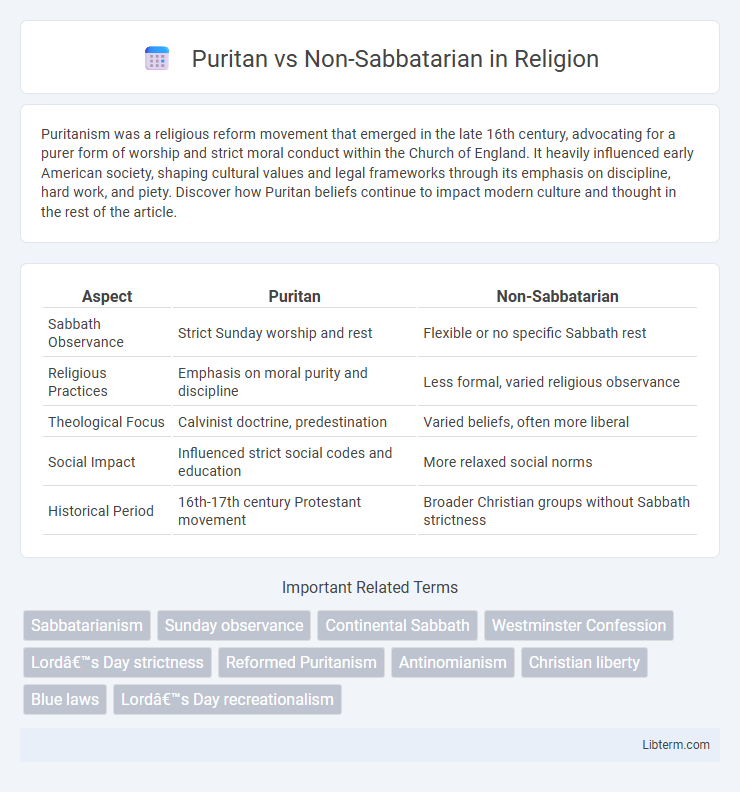Puritanism was a religious reform movement that emerged in the late 16th century, advocating for a purer form of worship and strict moral conduct within the Church of England. It heavily influenced early American society, shaping cultural values and legal frameworks through its emphasis on discipline, hard work, and piety. Discover how Puritan beliefs continue to impact modern culture and thought in the rest of the article.
Table of Comparison
| Aspect | Puritan | Non-Sabbatarian |
|---|---|---|
| Sabbath Observance | Strict Sunday worship and rest | Flexible or no specific Sabbath rest |
| Religious Practices | Emphasis on moral purity and discipline | Less formal, varied religious observance |
| Theological Focus | Calvinist doctrine, predestination | Varied beliefs, often more liberal |
| Social Impact | Influenced strict social codes and education | More relaxed social norms |
| Historical Period | 16th-17th century Protestant movement | Broader Christian groups without Sabbath strictness |
Introduction to Puritan and Non-Sabbatarian Beliefs
Puritan beliefs emphasize strict observance of the Sabbath, advocating for dedicated rest and worship as a means to honor God's covenant with His people. Non-Sabbatarians reject the obligation to observe the Sabbath on a specific day, viewing rest and worship as principles adaptable rather than legislated. The Puritan focus on Sabbath observance stems from a theological commitment to biblical commands, whereas Non-Sabbatarians prioritize the spirit of rest and devotion without fixed temporal restrictions.
Historical Origins: Puritan Sabbatarianism
Puritan Sabbatarianism originated in 17th-century England as a strict interpretation of the Fourth Commandment, emphasizing total rest and worship on Sunday, the Christian Sabbath. The Puritans sought to eliminate secular activities and enforce moral discipline, viewing Sabbath observance as a covenantal sign of God's people. This contrasted with Non-Sabbatarian beliefs that promoted Sunday as a day for both worship and leisure, reflecting less stringent historical and theological foundations.
The Roots of Non-Sabbatarian Thought
Non-Sabbatarian thought originated as a theological response to Puritan Sabbatarianism, challenging the strict observance of Sunday as a sacred day of rest. Rooted in early Christian interpretations, Non-Sabbatarians emphasize the liberty of all days being equally sanctified by faith rather than mandated rest by law. This perspective draws from biblical analysis, particularly the New Testament teachings that stress spiritual rest and freedom from legalistic observance.
Scriptural Interpretations: Sabbath Commandments
Puritans emphasize strict observance of the Sabbath based on commandments such as Exodus 20:8-11, interpreting it as a day dedicated exclusively to rest and worship, reflecting the Fourth Commandment's original intent. Non-Sabbatarians, however, argue that the Sabbath commandment was specifically tied to Jewish law and the Old Covenant, pointing to New Testament passages like Colossians 2:16-17 and Romans 14:5 to support flexible worship practices on any day. This divergence hinges on how each group views the continuity of Old Testament law, with Puritans adhering to a literal and perpetual Sabbath rest, while Non-Sabbatarians see the principle as fulfilled in Christ and not obligatorily binding.
Sabbath Observance: Puritan Practices
Puritan Sabbath observance emphasized strict rest from all forms of labor and recreational activities to honor the day as sacred, reflecting their belief in rigorous spiritual discipline and worship. They dedicated the entire day to prayer, sermons, and Bible study, avoiding any secular or commercial engagements to maintain holiness. This contrasted sharply with non-Sabbatarian practices, which often allowed more leniency in work and leisure on the Sabbath.
Non-Sabbatarian Approaches to the Sabbath
Non-Sabbatarian approaches to the Sabbath emphasize individual freedom and cultural context, rejecting strict Sabbath observance as mandated by Puritan traditions. These perspectives highlight the Sabbath as a principle of rest and worship rather than a legally enforced day of cessation from all labor. Non-Sabbatarian theology often draws from New Testament teachings, advocating for a flexible, grace-based observance that varies according to personal conviction and community practices.
Theological Arguments: Law and Grace
Puritans emphasized a strict observance of the Sabbath as a moral law grounded in the Fourth Commandment, viewing it as a covenantal sign reflecting God's holiness and demanding rest and worship. Non-Sabbatarians argued that the ceremonial aspects of the law, including Sabbath-keeping, were fulfilled in Christ, who brought grace that supersedes the strict legalistic observance of Old Testament commandments. The theological debate centers on whether the Sabbath remains a binding moral law under the new covenant or is abrogated by the grace offered through Christ's fulfillment of the law.
Cultural and Social Impacts of Sabbath Views
Puritan Sabbath observance reinforced strict social discipline and community cohesion by emphasizing rest and religious activities, shaping early American societal norms with a focus on morality and work ethic. Non-Sabbatarian views allowed more individual freedom, promoting diverse cultural expressions and leisure activities on Sundays, which influenced evolving social dynamics and tolerance in modern societies. These contrasting Sabbath perspectives significantly impacted cultural identity, social behavior, and community regulation across different religious and secular contexts.
Modern Perspectives: Contemporary Sabbath Observance
Modern perspectives on Sabbath observance reveal a clear divide between Puritan and Non-Sabbatarian views. Puritan traditions emphasize strict rest and worship on Sundays, aligning with a continuation of early Protestant Sabbath theology rooted in the Fourth Commandment. In contrast, Non-Sabbatarian approaches tend to adopt flexible practices, focusing on personal spiritual renewal and community engagement rather than rigid rest mandates, reflecting evolving cultural and religious dynamics in contemporary Christianity.
Conclusion: Lasting Influence and Ongoing Debates
The enduring influence of Puritan Sabbatarianism is evident in modern Sunday observance practices, shaping religious, cultural, and legal norms regarding rest and worship. Non-Sabbatarian perspectives continue to challenge strict Sabbath restrictions, advocating for personal freedom and diverse expressions of faith. Ongoing debates highlight tensions between tradition and contemporary interpretations of Sabbath observance within Christian communities.
Puritan Infographic

 libterm.com
libterm.com